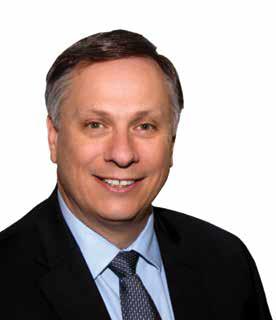
15 minute read
President’s Message
Start Planning Your Professional Journey!
Twenty-five years ago, leaders in this industry perceived a threat to the existence of community management and forged an alliance to combat our adversaries and keep our industry outside of the domain of the then Department of Real Estate.
Through their prudence and wisdom, our founding members defended our freedom to organize and grow our profession without direct governmental oversight of our activities. We agreed that our future would be in the hands of the industry. We agreed to form the association with the purpose of self-regulation and building an environment for professional development and success. And we, therefore, established the California Association of Community Managers to accomplish this.
For the past 25 years, we have been defending our rights through our legislative activity and political action. We have ensured management competency through ongoing education and credentialing programs. And – by enforcing a strict Code of Professional Ethics and Standards of Practice applicable to all who are members of this association – we have defended our industry from those who would seek to tarnish its image.
These efforts continue today, and several recent initiatives have greatly enhanced our ability to elevate professionalism within the California community management industry. For example, the Community Association Management Executive (CAMEx) designation program not only gives experienced executive leaders a way to meaningfully engage with our organization and contribute to the health and stability of our industry, but also provides less experienced managers access to a phenomenal source of knowledge, wisdom and mentorship. If you are seeking to raise your own professional knowledge and presence, reaching out to one of our CAMEx designees is a great place to start.
Even if you are already a seasoned executive, there are still ways to up your game. Our Executive Leadership Summit – coming to the Ritz-Carlton Laguna Niguel June 8-9 – has been developed with substantial input from our CAMEx leaders to provide a high level learning and sharing experience focused on the most critical issues affecting our management businesses.
Other events are available to community managers at all levels of experience and knowledge. Most of our Spring Regional Forums will take a fun-filled look at the risks and rewards of hosting community events and web sites, while the San Diego Forum will explore the threat of fraud and embezzlement, citing some recent industry examples.
In the fall, Regional Forums will provide an early look at new legislation and case law, and concurrent summits held at Lake Tahoe’s Resort at Squaw Creek will provide specialized learning and knowledge sharing for High Rise and Large Scale managers. As announced at our recent Law Seminars, we also will soon launch our new Flex Learning Program, which offers a combination of in-person, online, on-demand and microlearning options. Through our online EduCenter, you will be able to access education experiences in all of these formats, gaining valuable industry knowledge as well as leadership and soft skills. And we’re making development opportunities available to your entire team – support staff as well as your association board members. I look forward to sharing more about these and other initiatives in the near future. In the meantime, enjoy this issue of Vision magazine, while continuing your professional journey.
what is PROFESSIONALISM and what does it mean to you?
By Daniel W. Porcupile
You know that it's essential to be professional if you want to be a success. But what does "being professional" actually mean?
For some, being professional might mean dressing smartly at work, or doing a good job. For others, being professional means having advanced degrees or other certifications, framed and hung on the office wall. Professionalism encompasses all of these definitions. But, it also covers much more.
So, what is professionalism, and why does it matter? And how can you be completely professional in your day-to-day role? In this article we'll explore all of these questions, so that you can present a really professional image in the workplace

Defining Professionalism
The Merriam-Webster dictionary defines professionalism as “the conduct, aims, or qualities that characterize or mark a profession or a professional person”; and it defines a profession as “a calling requiring specialized knowledge and often long and intensive academic preparation.”
These definitions imply that professionalism encompasses a number of different attributes, and, together, these attributes identify and define a professional.
So, what are these attributes?
Specialized Knowledge
First and foremost, professionals are known for their specialized knowledge. They've made a deep personal commitment to develop and improve their skills, and, where appropriate, they have the degrees and certifications that serve as the foundation of this knowledge.
Not all business areas have a stable core of knowledge (and the academic qualifications that go with this); not all areas demand extensive knowledge to practice successfully; and not all professionals have top degrees in their field.
What matters, though, is that these professionals have worked in a serious, thoughtful and sustained way to master the specialized knowledge needed to succeed in their fields; and that they keep this knowledge up-todate, so that they can continue to deliver the best work possible.
Competency
Professionals get the job done. They're reliable, and they keep their promises. If circumstances arise that prevent them from delivering on their promises, they manage expectations up front, and they do their best to make the situation right.
Professionals don't make excuses, but focus on finding solutions.
Honesty and Integrity
Professionals exhibit qualities such as honesty and integrity. They keep their word, and they can be trusted implicitly because of this. They never compromise their values, and will do the right thing, even when it means taking a harder road.
More than this, true professionals are humble – if a project or job falls outside their scope of expertise, they're not afraid to admit this. They immediately ask for help when they need it, and they're willing to learn from others.
Accountability
Professionals hold themselves accountable for their

Strategies to Enhance Your Professional Presence
Build Expertise Don't let your knowledge and skills get outdated. Make a commitment to build expertise and stay up-to-date with your industry.
Develop Your Emotional Intelligence Professionals can sense the emotional needs of others. They're able to give clients and coworkers what they need, because they know how to listen actively and observe what's happening. So, if you want to improve your professionalism, focus on developing emotional intelligence.
Honor Your Commitments
Whenever you make a promise to your boss, colleagues, or clients, keep it. If it looks as if you won't be able to meet a deadline, let your boss, team or client know as soon as sensibly possible. However, do what you can to avoid ending up in this situation!
Don't make excuses – instead, focus on meeting expectations as best you can, and on making the situation right.
Be Polite
Be kind and polite and use good manners to everyone you come into contact with, no matter what their role is, and no matter how you're feeling. This might sound unimportant, but it makes a significant impact.
Have the Tools You Need
Do you show up to a client meeting lacking important samples? Or arrive at work, only to realize that you left a vital file at home? Or do you find yourself operating in situations where you don't have the skills needed to do a good job?
True professionals are always prepared. This requires advance planning, timeliness and attention. Focus on improving your time management and planning skills, so that you're always in control.
Note: Although professionalism means keeping commitments, doing high quality work, and having expert status, occasionally the pursuit of these attributes might tempt you not to volunteer for projects that fall outside your comfort zone.
However, this doesn't necessarily mean that you shouldn't try! Analyze risks beforehand to minimize the consequences of getting things wrong, be honest about any skills gaps that you have, and work to fill them. Then do the best you possibly can!
You can also exude professionalism by being kind and polite to everyone, presenting a professional image in your attitude and dress and showing up for work or meetings fully prepared.
What is Professionalism?
Continued from page 9 thoughts, words and actions, especially when they've made a mistake. This personal accountability is closely tied to honesty and integrity, and it's a vital element in professionalism.
Self-Regulation
They also stay professional under pressure.
For instance, imagine a customer service employee who's faced with an irate customer. Instead of getting upset or angry in return, the employee exhibits true professionalism by maintaining a calm, business-like demeanor and by doing everything that she can to make the situation right.
Genuine professionals show respect for the people around them, no matter what their role or situation. They exhibit a high degree of emotional intelligence (EI) by considering the emotions and needs of others, and they don't let a bad day impact how they interact with colleagues or clients.
Image
Professionals look the part – they don't show up to work sloppily dressed, with unkempt hair. They're polished, and they dress appropriately for the situation. Because of this, they exude an air of confidence, and they gain respect for this.
How to Exhibit Professionalism
As you can see from these characteristics, professionals are the kind of people that others respect and value. They are a genuine credit to their organizations!
This is why it's so important that we work to earn a professional reputation in the workplace. True professionals are the first to be considered for promotions, they are awarded valuable projects or clients, and they are routinely successful in their careers.
Now that you have a clear view of what constitutes professionalism, are you demonstrating these characteristics to the people around you? It's likely you're already showing some characteristics, but you may find yourself lacking in others: to build your own professionalism, focus on improving each of these characteristics. (Focus on one at a time, so you don't get overwhelmed.)
Reprinted with permission. Daniel W. Porcupile, USMC/ USA Ret., is a management consultant at Timberdog Services.



Discover Energy Efficiency Made Easy
We Can Help Make Your Community More Efficient


A Wealth of Energy-Saving Solutions
Our experts will show you specific energy efficiency and cost-reduction measures you can put in place. Come learn about products and services we offer to make saving energy easier, rebates, and incentives for installing or upgrading to high-efficiency equipment, plus electric vehicle support for tenants who choose these vehicles.

Save Big with a $1,000 Pool Pump Rebate
Old, fixed-speed pumps could be wasting up to $1,100/pump in energy annually. 1 That’s why we will give you a $1,000 rebate for every variable-speed replacement. You’ll see energy savings of up to 45%, reduced maintenance costs, and treat tenants to a cleaner, quieter pool environment. Be sure to take advantage of this great offer!
Want to Learn More About Multifamily Support Offerings? Explore Email sce.com/multifamily multifamily@sce.com


1 Savings based on variable-speed pump compared to a single-speed pump running 10 hours per day at an average of $0.165 per kWh in a 32,000 gallon pool. Actual savings may vary based on utility rates, pool size, pump run time, pump horsepower, pump rpm, plumbing size and length, pump model, service factor, and other hydraulic factors. Programs are funded by California utility customers and administered by Southern California Edison under the auspices of the California Public Utilities Commission. Funds are limited and are available on a first-come, first-served basis and may be amended or terminated without prior notice. Terms and conditions apply. © 2017 Southern California Edison. All rights reserved.

moving beyond burnout
There is an anecdotal expiration date of three years on managers in our industry, after which “manager burnout” is said to take its toll, with few survivors. So how am I still here after 16 years? How are others pushing 25 or 30 years in the industry? How does one get past “manager burnout” and chart a successful and rewarding career path in community management?
BY DEAN JACKSON, CCAM-HR
Moving Beyond Burnout While support and advice may have been available in Continued from page 13 my office, I didn’t even know the questions to ask. I was Ok, I’ll admit it… I prefer a t-shirt to a tie, sandals frustrated, tired and ready to call it quits. Unfortunately, to a suit and denim to dress shirts. I also hadn’t learned not to take Yet, over the last eight years at my work home with me, so every day current job, I can count on one When I started to I packed a briefcase full of worry, hand the number of times I’ve been seen without a tie (generally an think of community frustration and exhaustion, and then unpacked it at home… with afterhours or weekend emergency). management as a my wife. She was starting to get This isn’t another article about dressing for success, it’s about, career I was able to stop “manager’s spouse burnout.” There was no light bulb, no well… how did I get here? treating it like a job. epiphany, no single moment that Ahead of schedule, about 14 I can point to that rescued me years ago, “manager burnout” came from that downward trajectory. knocking, moved in, set up house and rearranged the Gradually I learned how to prioritize, organize and furniture. For me the burnout took the form of feeling communicate in order to get ahead of issues. There were overwhelmed and under organized. I was managing a times when I learned the right questions to ask and the good sized portfolio of communities, and I felt like I was right managers to observe. Ultimately though, when I constantly spinning plates and putting out fires. Each started to think of community management as a career I community was pulling my attention, and I was being was able to stop treating it like a job. It was at that time reactive rather than proactive in managing the situations. that career goals could come into focus, and I could take

With the help of the mentors in my office, I became interested more in proactive work than reactive firefighting.
advantage of the available resources in order to reach them. From there it wasn’t long before I bought my first tie and learned to limit the luggage I brought home from the office.
Initially, with the help of the mentors in my office, I became interested more in proactive work than reactive firefighting. I became interested in gaining knowledge and expertise and began planning in advance to take the specific CACM courses that would address my weaknesses as a manager and reinforce my strengths. I also took advantage of the opportunity to learn from more seasoned managers and assist those less seasoned. I was asked to participate in the interview process for new clients, and my portfolio began to take shape around my specific skill and experience set (in my case, water intrusion issues and rental restrictions), and I was able to pass on some of that knowledge to my coworkers.
CACM provided insight into specialties within the community management field and fostered relationships with my peers. The educational programs developed by CACM, coupled with my expanding skill set provided a foundation to pursue on-site positions, and half Windsor knots (I still can’t tie a full Windsor). Once on-site, CACM’s expanding educational programs, such as the specialty certificate program added to my skills and enhanced my resume (while adding several letters behind my name).
There are still many courses to take, designations to earn and letters to add behind my name. A manager’s education is never done (especially with ever changing hurdles presented by those folks in Sacramento), and with evolving educational opportunities and management specialties, a manager can move past burnout and towards a bright future.
Dean Jackson, CCAM-HR, is General Manager of Pacific Park Plaza Homeowners Association in Emeryville.

Take Charge of YOUR Career
As a new (or not so new) manager, it is important to be certified and to keep up with your continuing education credits to maintain your credentials. But committing to making a career of community management takes more than just keeping up with your credentials. You need to continue to add to your knowledge base and stretch yourself. This is your life, this is your career, take charge of it.
You may be fortunate enough to have your employer pay for continuing education. But, if you do not get that support, you should care enough about your career to pay for ongoing certification on your own. Special bonus! Educational investments may be tax deductible, so keep that in mind as you take your classes and attend seminars.
CACM is your one stop shop to further your understanding and give you a boost in the industry. Here are some great options to consider:
Too busy to get away from the office? CACM now offers 12 online classes. The CACM Attorney Connection Webinar series – offered weekly throughout the month of August – is another great place to advance your knowledge. They are only one hour each and offer legal insights from attorneys who specialize in California HOA law.
Go Further with CACM Specialty Certificate Courses • Three-day classes get you away from distractions and immersed in the subject matter. • You get to know other participants and get valuable networking time. • Subjects include New Development, Large Scale, Age-Restricted Active Adult, Commercial and Industrial, High Rise and other great options.
MCAM Courses • For those who want an advanced degree in community management. • In depth and high level coursework to master the realm of community management. • This certification is the highest professional recognition for California managers.
Put yourself and your career goals first. Furthering your education makes your résumé shine, your confidence grow and energizes you to continue to explore this always exciting career path.
Lori R. Storm, CCAM, is a community manager with FirstService Residential California, LLC in Gold River.







